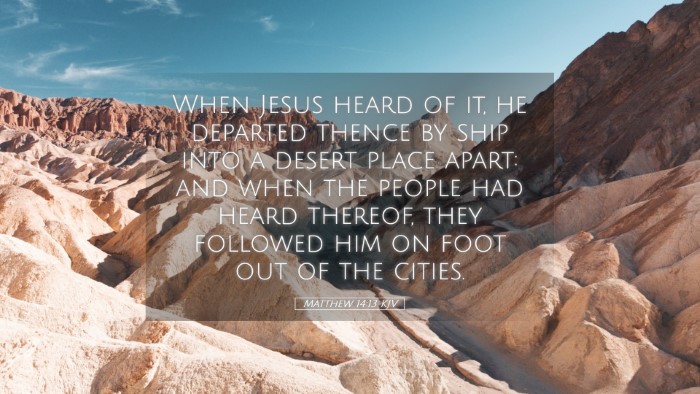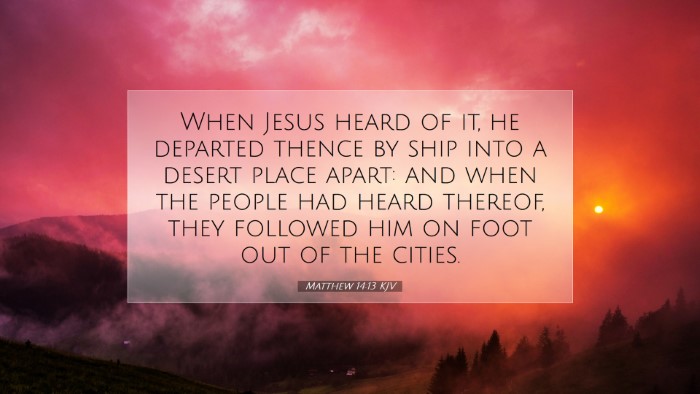Commentary on Matthew 14:13
Verse: "When Jesus heard of it, he departed thence by ship into a desert place apart: and when the people had heard thereof, they followed him on foot out of the cities."
Contextual Overview
This verse is situated in the context of John the Baptist's death, which was a significant event for Jesus and His ministry. Upon hearing the news, Jesus seeks solitude, reflecting on the emotional weight of the situation. The verse underscores both His human vulnerability and His divine mission.
Interpretive Insights
The various public domain commentaries provide rich insights into the implications of this passage.
Matthew Henry's Commentary
Matthew Henry points out that Jesus’ withdrawal to a solitary place demonstrates His need for communion with God in the face of grief. This action signifies the importance of retreating to mend one's spirit and seek divine guidance, especially during times of loss.
- Henry underscores that even Jesus, though fully divine, experienced authentic human emotions, serving as a model for His followers in their moments of sorrow.
- He also comments that the ‘desert place’ symbolizes a space for reflection and prayer, where Jesus could prepare for His impending challenges.
Albert Barnes' Notes on the New Testament
Albert Barnes elaborates on the arrival of the people, noting their determination to follow Jesus even into desolate areas. This reaction reveals the depth of their need and desire for His teachings and miracles.
- Barnes emphasizes that the people's pursuit highlights the magnetic nature of Jesus' ministry, illustrating the draw of His compassion and miracles.
- He notes the contrast between the solitude that Jesus sought and the crowd's fervent need for His presence, inviting reflection on the nature of spiritual hunger.
Adam Clarke's Commentary
Adam Clarke provides further insight into the geographical importance of this verse, noting that the location of the desert place signifies a strategic retreat by Jesus to avoid overwhelming circumstances and to prepare Himself for further ministry.
- Clarke discusses the historic significance of the surrounding regions, suggesting that this retreat was not just physical but symbolically represented Jesus' preparation for the coming challenges with the crowd.
- He also interprets the term ‘desert’ as a space purposely chosen by Jesus for prayer and communion with His Father, reinforcing the theme of solitude in His life.
Theological Reflections
This verse invites deeper theological reflection on the nature of Christ's earthly ministry.
- The Humanity of Christ: The human emotions of grief experienced by Christ remind believers of His empathy and the validity of experiencing sorrow in the Christian life.
- The Call to Solitude: Jesus' retreat into solitude serves as an example for His followers on the importance of withdrawal for prayer, contemplation, and renewal, essential elements in the life of any believer and leader.
- The Pursuit of Christ: The enthusiastic pursuit of Jesus by the crowds indicates the compelling nature of divine love and the innate human desire for meaning and healing found in Christ.
Application for Pastors and Theologians
This passage carries profound implications for pastors, students, and scholars:
- Encouragement in Ministry: Pastors are reminded that solitude is not a sign of weakness but of strength, a space to process grief and gather strength from God before engaging with the demands of ministry.
- Understanding Congregational Needs: It encourages church leaders to recognize the profound needs within their congregations, illustrating the importance of being present to respond to those needs while also recognizing their own limits.
- The Centrality of Christ: Scholars are challenged to explore the relationship between Christ’s humanity and divinity and how it informs contemporary understanding of Jesus' interaction with humanity.
Conclusion
In reflecting on Matthew 14:13, we encounter a multidimensional view of Jesus as both a human who seeks solace in times of sorrow and as a divine figure who draws people to Himself. The rich insights from the commentaries of Matthew Henry, Albert Barnes, and Adam Clarke invite a deeper understanding of His ministry and its implications for the lives of believers today.


